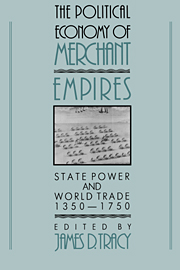Book contents
- Frontmatter
- Contents
- Acknowledgments
- Introduction
- 1 Institutions, Transaction Costs, and the Rise of Merchant Empires
- 2 Merchants and States
- 3 The Rise of Merchant Empires, 1400–1700: A European Counterpoint
- 4 Europe and the Wider World, 1500–1700: The Military Balance
- 5 The Pirate and the Emperor: Power and the Law on the Seas, 1450–1850
- 6 Transport Costs and Long-Range Trade, 1300–1800: Was There a European “Transport Revolution” in the Early Modern Era?
- 7 Transaction Costs: A Note on Merchant Credit and the Organization of Private Trade
- 8 Evolution of Empire: The Portuguese in the Indian Ocean During the Sixteenth Century
- 9 Comparing the Tokagawa Shogunate with Hapsburg Spain: Two Silver-Based Empires in a Global Setting
- 10 Colonies as Mercantile Investments: The Luso-Brazilian Empire, 1500–1808
- 11 Reflections on the Organizing Principle of Premodern Trade
- Selected Bibliography of Secondary Works
- Index
5 - The Pirate and the Emperor: Power and the Law on the Seas, 1450–1850
Published online by Cambridge University Press: 25 March 2010
- Frontmatter
- Contents
- Acknowledgments
- Introduction
- 1 Institutions, Transaction Costs, and the Rise of Merchant Empires
- 2 Merchants and States
- 3 The Rise of Merchant Empires, 1400–1700: A European Counterpoint
- 4 Europe and the Wider World, 1500–1700: The Military Balance
- 5 The Pirate and the Emperor: Power and the Law on the Seas, 1450–1850
- 6 Transport Costs and Long-Range Trade, 1300–1800: Was There a European “Transport Revolution” in the Early Modern Era?
- 7 Transaction Costs: A Note on Merchant Credit and the Organization of Private Trade
- 8 Evolution of Empire: The Portuguese in the Indian Ocean During the Sixteenth Century
- 9 Comparing the Tokagawa Shogunate with Hapsburg Spain: Two Silver-Based Empires in a Global Setting
- 10 Colonies as Mercantile Investments: The Luso-Brazilian Empire, 1500–1808
- 11 Reflections on the Organizing Principle of Premodern Trade
- Selected Bibliography of Secondary Works
- Index
Summary
“ For elegant and excellent was the pirate's answer to the great Macedonian Alexander, who had taken him: the king asking him how he durst molest the seas so, he replied with a free spirit, ‘How darest thou molest the whole world? But because I do with a little ship only, I am called a thief: thou doing it with a great navy, art called an emperor.’”
St. Augustine, The City of God, Book IV, Chapter IV.There is a description of piracy that spans the ages: illegal and armed aggression at points of maritime traffic that are important but under weak political control. The aggression is committed by the marginal who seek to appropriate the wealth of the more affluent, or by new-comers desiring to force their way into preexisting trade routes. This elementary description tells us about plundering and illegality; it tells us about immediate causes and motivations. But it leaves out the questions of what law is invoked against the pirate, and behind the law, of what power is involved in this maritime confrontation over matters of trade.
In the rise of merchant empires at the beginning of the modern era that is the focus of this book, what is called piracy is also easily recognizable. From sea to sea and age to age, we observe the same phenomena appearing – at once picturesque, violent, and sordid.
- Type
- Chapter
- Information
- The Political Economy of Merchant EmpiresState Power and World Trade, 1350–1750, pp. 196 - 227Publisher: Cambridge University PressPrint publication year: 1991
- 15
- Cited by

